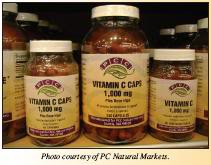The market reports speak for themselves: private labeling is hot, hot, hot! U.S. shoppers spent $81 billion on store brand items in 2008, marking a 10% increase in sales over the past year. And better yet, most shoppers (62%) say store brands are as good in quality as name brands, with 35% willing to pay as much or more for a high-quality store brand (1).
Pair these data with interesting analysis of 50,000 Web-message board conversations (March 2008–March 2009) from the J.D. Power and Associates Web Intelligence Division. The firm found that private labeling pricing is important to shoppers, but “the quality and flavor of private label organic products drive the highest levels of positive sentiment.” Store brands from Trader Joe’s, Whole Foods Market and Safeway received particularly high praise for high-quality natural and organic items (2).
Given this, it’s hard to argue with Erin Silva, M.S., R.D., technical marketing manager at Vitamer Labs, Irvine, CA, who says, “It is a great time to be in private label.”
 Why Private Labeling and Why Now?
Why Private Labeling and Why Now?
There once was a time when purchasing a store brand item was considered a task for only the most frugal of shoppers who didn’t mind sacrificing quality to save a buck or two. Well, times have changed. As Douglas Preston, president of Preston Private Label Products, Santa Fe, NM, puts it, “Private label retailing, while not a new concept, has finally come into its own.”
One factor giving more traction to private labeling is the transformation to a “quasi-name brand.” This strategy involves attracting shoppers to store brands with high-quality, attractive products that are competitive with brand names in areas other than just price.
“Retailers have masterfully shifted the consumer consciousness from generic to private label, from no brand to store brand,” observes Karl S. Halpert, president and CEO of Private Label Select Ltd. Co., a manufacturer of organic and natural personal care products located in Taos, NM. “This category now implies a strong consumer value: high quality and low price. Store brands are as thoughtfully packaged as their branded counterparts, with the quality backed by the integrity of the retailer.”
Take the Whole Foods Market brand, for example. The store’s 365 Everyday Value and 365 Organic brands comprise a whopping 2,300 SKUs and a large share of customers’ shopping lists. According to the company’s 2008 annual report, sales of its private label brand made up 25% of its total retail grocery sales and 10% of its total retail sales across the board. That’s close to $8 million! And, both figures are up from its 2007 sales (18% and 9% respectively) and are climbing higher. Whole Foods Market anticipates private label sales will grow “as we continue to focus on the development and growth of our product lines.”
To what does this retail giant contribute its brand’s success? In their words, the “confidence” and “trust” that shoppers have in their store. The store also states that the purpose of the brand isn’t only to give it a better profit margin on these items than name brands; it is to help differentiate its stores.
Let’s dig in a bit deeper on this point.
|
Top Private Labeling Trends And now the moment you’ve been waiting for: what are the hottest requests that private labeling specialists field in 2008–2009? Here’s what the experts had to say about: Supplements:
Retailers interviewed for this article agreed on many of these items, especially vitamin D. Wendy McLain, health and beauty aids merchandiser at PCC Natural Markets, Seattle, WA, said her store’s vitamin D sales (1,000 IU) were up 48% in the first quarter of 2009. She also noted increased sales of whey protein (up 17%). Cheryl Hughes, owner of The Whole Wheatery, Lancaster, CA, noted her store’s popular private label items include those for good digestive health, vitamin and fish oil, especially the “new tasty versions.” And she adds another item to the manufacturers list: products for life transitions. In her words, “Women’s menopause products always rock.” And, Donna Kay says hot items at Lori’s Natural Foods, Rochester, NY, include calcium citrate with vitamin D, resveratrol, oregano oil, açaí and eye health products. Here’s a list of what experts note as trends in other parts of your store: Grocery Products:
Personal Care Items:
Another notable trend comes from Golden Butterfly Co., Dallas, TX. The company’s president, Sherion Stevens says, “It amazes me the number of inquiries we get for all-natural shampoos and conditioners for dogs…[Pet products] is a growing market.” |
Something New and Different. A core advantage of having a store brand is that it contributes to your store’s individuality. In other words, it gives consumers who are tired of the same old thing a reason to return to your store again and again. With traditional grocers and retailers like WalMart and Target now claiming a piece of the natural/organic pie, consumers are over-saturated with shopping options. A great store brand may be enough to attract and keep shoppers looking to try something new and special.
This may be especially true of younger shoppers, who “have begun to identify more with niche brands than mass brands, distinguishing themselves as unique and individualistic,” says Preston, whose firm specializes in natural/organic skin and body care products.
The Post-Recession World of Private Labeling. A recent report from the Nielsen Company’s Fact, Figures, & the Future newsletter called 2008 a “stellar year for store brands in the United States” (3). The firm equated the 10.2% sales growth among food, drug and mass merchandisers with the growth during the 2001 recession, which begs the question: are increased private label sales tied to tough times? Will sales recede once the economy improves?
Absolutely not, say industry insiders. Says Frank King, owner and president of homeopathic medicine specialist, King Bio, Asheville, NC, “Private label and store brands are definitely here to stay in any economy. Consumers have been well educated to recognize the value of store brands produced many times by the same manufacturer as the national brand or the equivalent.”
This point hits the core of what’s happening in today’s private labeling world: store brands are being treated like name brands. “Most retailers have come to the realization that if they partner with the right private label manufacturer, they can produce products in their own label that are as good or better than the brand version,” says Tim B. Greene, director of branded and private label sales, Century Foods International (a division of Hormel Foods), Sparta, WI. “I actually believe the current economy provides an opportunity for retailers to showcase how far private brands have come and to retain the consumers that have never tried them before.”
Retaining customers is what it’s all about. If the quality is high and the product is efficacious, there’s no reason for shoppers to switch brands once the economy improves. This is especially the case with organic personal care brands, says Lynn Betz, co-founder and president of Sensibility Soaps, Inc., Beaver Falls, PA. “Retailers recognize this growing market of organic consumers and are anxious to offer to consumers their own USDA certified organic brand,” she says. “Comparing true organic personal care to national brands are apples to oranges so sometimes retailers can have some difficulty with positioning because these products are new to the marketplace. I believe private label sales will continue to prosper in this weak economy and will be even stronger in a healthier economy.”
Conversely, it should be noted that retailers who build their brand as strictly a cost-saving brand may have trouble once consumers have more cash to spend. Siva P. Hari, Ph.D., president and CEO of Jarrow Industries, Inc., Santa Fe Springs, CA, notes when you’ve got a price-based motive, it “tends to have no strategic growth and therefore waxes and wanes with prices, shortages and economic recovery.”
Innovation and Private Labeling
Going beyond the world of “Me, too” is important for driving private labeling success and retailers are well-suited to do so. Savvy store managers can analyze customer needs and cater private labels for their client bases. This keeps consumers interested in the brand and raises its profile. Says Greene, “Retailers know their customer base better than any branded company and are uniquely positioned to develop products that fit their unique customer attributes.”
So, how is innovation accomplished? Retailers can make their line original if they “are willing to go the extra mile to bring new products to market,” says Peter Sokoloski, private label manager at NOW Foods, Bloomingdale, IL. Doing this, he says, is a matter of analyzing your clientele’s preferences and bringing in custom formulations.
Offering unique items gives the retailer “a good story” to tell customers, says Paul Licata, president of Licata Enterprises, Huntington Beach, CA, such as why their digestive enzyme is superior to others they sell.
Admittedly, the prospect of using private labels to bring in something new and different may feel a bit precarious. After all, it’s safer to mirror the top-selling branded items. But, more and more stores are taking risks with unique private labels—and it’s paying off, too. Says Betz, “To keep brands fresh and exciting, retailers need to take more calculated risks and offer products, which do not mimic a national brand. It is certainly less risky to duplicate a successful product than introduce products, which have no sales history, however, I see more and more retailers taking a leadership position and launching USDA-certified products, for example, because they can meet growing consumer demand, are innovative, ‘green’ and support health and wellness.”
Taking risks isn’t for everyone, however, and while innovation is part of creating a successful private label line, retailers can be just as successful by learning from their store’s sales. Choose items that are similar to your best sellers and consider tweaking them. “A store might be motivated by the success of another product on the market and will want to imitate it,” says Andrew Levine, president of Yellow Emperor, Inc., Eugene, OR. “However, if they are smart, they will look to exceed the effectiveness of the existing product.”
Don’t feel you have to do this all on your own. A high-quality private label maker will have the expertise to assist in product development. Says Levine, “It is often my experience that the product can benefit from some creative additions. In such cases, I will suggest modifications to the existing formula to create a better one.”
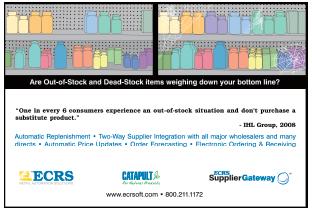 Halpert agrees on this front, who notes that the key to an exciting store brand is forging a strong partnership with a creative manufacturer. “The manufacturer is going to be the entity that develops new ideas and progressive technologies. And since product development is market-driven, manufacturers’ innovations will benefit the retailers with whom they have established rapport, trust, and a sense of partnership, a sense of like-minded mission. This is especially true around areas of green chemistry and sustainable business practice.”
Halpert agrees on this front, who notes that the key to an exciting store brand is forging a strong partnership with a creative manufacturer. “The manufacturer is going to be the entity that develops new ideas and progressive technologies. And since product development is market-driven, manufacturers’ innovations will benefit the retailers with whom they have established rapport, trust, and a sense of partnership, a sense of like-minded mission. This is especially true around areas of green chemistry and sustainable business practice.”
King Bio, for example, offers an upgraded version of its national brand equivalents called National Brand Advancements, which provides “the same qualities of the national brand plus additional benefits and features.” Examples of such advancements include offering a pure water base (as opposed to the alcohol base found in some brands), larger sizes, multi-potency strengths, multi-delivery options and more. Says King, “Show your customers you really care by providing greater value at a better price.”
Some manufacturers note they collect and share market research and then think outside the box with product offerings. For example, in response to unmet need, Vitamer became one of the first companies to offer certified organic dietary supplements. Says Silva, “By offering certified organic dietary supplements in our Ultimate Organics line, we were ahead of the brands!”
Sherion Stevens, president of personal care private labeler Golden Butterfly Co., Dallas, TX, notes that retailers shouldn’t let customization get in the way of quality for innovation’s sake. Using her company’s body lotions as an example, she notes, “We allow clients to add a variety of essential oils for fragrance or effectiveness—as long as it doesn’t compromise the integrity of the product.” For example, the company often dissuades its clients from using synthetic fragrance oils and recommends natural essential oils be used “carefully and respectfully,” says Stevens.
Secrets of Success
Like any product, an intelligent marketing plan will make a private labeling line fly off shelves. Says Syang Su, Ph.D., president of MegaCare Inc., Las Vegas, NV, “Any manufacturer or marketer can claim their products to be unique, innovative or top-of-the-line, but effective marketing is much more complex.”
WholeFoods asked a few stores with successful private label lines to share what they’ve done to drive private label sales in their stores. It’s clear that Rule #1 is to play up the customer trust factor. Cheryl Hughes, owner of The Whole Wheatery, Lancaster, CA, says her store makes a concerted effort to tie the quality of her private label manufacturer to her line, which includes herbal supplements, packaged fruits, nuts and other items. “We are proud of our line and love to tell the story of who makes it and how, as well as the quality of the company,” she explains, noting that this ensures questions about product quality “are never an issue.”
 Lori’s Natural Foods, Rochester, NY, also uses quality and trust to their advantage for selling its private label line of supplements, soaps, ear candles, grocery products and t-shirts. Says Donna Kay, the store’s buyer, “We work hard to find the best products available to put our name on and we have high expectations about quality and service. We do our best to get this product to our customer at an affordable price.”
Lori’s Natural Foods, Rochester, NY, also uses quality and trust to their advantage for selling its private label line of supplements, soaps, ear candles, grocery products and t-shirts. Says Donna Kay, the store’s buyer, “We work hard to find the best products available to put our name on and we have high expectations about quality and service. We do our best to get this product to our customer at an affordable price.”
In the rare event a customer has a question about quality, Kay notes the importance of having a strong relationship with the private label manufacturer. “We can get the information and/or resolution quickly from our supplier allowing us to give our customers excellent service,” she says.
Rule #2 is to make smart choices with product selection and promotion. PCC Natural Markets, Seattle, WA, has done some interesting work promoting its line of vitamins, minerals, amino acids and protein powders. The store partnered with its private label manufacturer to support Vitamin Angels’ Operation 20/20 initiative. “During PCC/Vitamer Vitamin Angels promotions, PCC donates 25 cents to Vitamin Angels for each PCC-labeled vitamin or supplement sold and Vitamer contributes an additional 10 cents per item sold,” says Wendy McLain, health and beauty aids merchandiser. “The first PCC/Vitamer promotion took place in September 2008 and was so successful, it was repeated in March 2009. Between the two promotions, almost $7,500 was contributed to Vitamin Angels by PCC and Vitamer.”
McLain also makes use of a variety of media to offer information about its store brand, including its monthly newspaper, its electronic newsletter and printed material in stores.
Sampling also is important to promoting private labels. McLain’s store offers many opportunities to try its supplements through classes as well as ongoing vendor and passive in-store demos. And, Lori’s Natural Foods hands out samples and places testers on shelves.
Hughes says her store runs special 20% off sales to increase purchasing. “We regularly offer promotions on the line and always have items on sale,” she notes. And, the store puts a private label item in every gift basket it donates to community functions.
Another great idea from The Whole Wheatery is to encourage employees to use the line so they can better tell customers about the efficacy. Says Hughes, “My employees take the line regularly and receive a generous discount to use the products. We sample those items we can and run line drives several times a year.”
McLain agrees, noting, “Many PCC employees and their families use our private label products and can speak to customers from first-hand experience about their quality and efficacy.”
This suggestion is related to one last point from Su of MegaCare about collecting customer feedback for promotional use. “Once the customer experiences product benefits, repeat purchases occur and friends and family are introduced to the product. The power of testimonials cannot be denied,” he says. “From my experience, good products sell themselves—people share good things with friends and family.”
Preston agrees, adding, “Consumer testimonials in advertising speak for the product in a way that’s far more convincing than the company’s own claims. Use a lot of those!”
Show Off Your Quality
We’ve talked a bit about how retailers can benefit from picking a high-quality manufacturer and telling consumers why they did so. Another way to get the message across is with the look of your line. The right packaging spells quality and innovation. And, it should look just as good as any national brand.
“The appearance of the product is the first impression to the consumer, so it must be perfect,” says Silva, noting that Vitamer uses amber glass bottles with a full-body sleeve to underscore product quality.
Adds Greg Martin, vice president of Plenish Skin Care, Ranchos de Taos, NM, “The place to splurge is on packaging and graphics that will set your brand apart from everything on the shelf….Consider packaging as the point of difference for your brand.”
Sokoloski raises the point that labeling is critical here. “Show the quality aspects right on the label,” he advises. “Retailers need to design labels that look professional and convey the message that they want their brand to show. Does it need to look medicinal, or imply value, or appear traditional, or modern/cutting edge? The values you hold as important must also be reflected in your choice of packaging.”
Levine of Yellow Emperor notes that one should be careful not to ask a private labeler to formulate with a trendy ingredient that is just “window dressing” and isn’t helpful to the formulation. “It is on the label to attract attention and to make a sale due to a buzz word ingredient name or sound byte recognition without adequate strength to be functional,” he explains. “I try to dissuade a prospective client from going in this direction. Make the product useful.”
Some other points to consider about labeling are aesthetics. “Label design needs to be uncluttered and visually pulled together,” says Sunil Kohli, COO of Health Plus, Inc., Chino, CA. “Stick with one font: one font can be changed with italics, bold, and point size, but it will have uniformity. Colors are tricky. They should all be of the same color density, again for uniformity. For example, a neon green with a muted burgundy looks jarring.”
Specific items to include on your labels include listing all ingredients, cautions, warnings and supplement information. “A good manufacturer should be able to provide the proper FDA-mandated label information,” Sokoloski says.
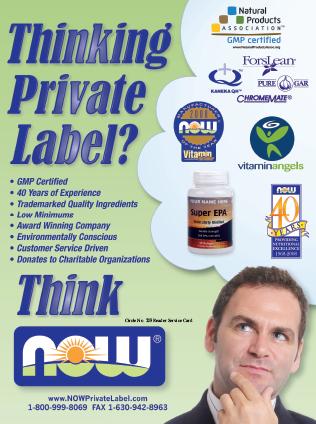 Another great way to illustrate the point of quality is to use a good manufacturing practice (GMP) logo on your store brand. This label, says Sokoloski, “is an excellent seal-of-approval that the consumers will respond to.”
Another great way to illustrate the point of quality is to use a good manufacturing practice (GMP) logo on your store brand. This label, says Sokoloski, “is an excellent seal-of-approval that the consumers will respond to.”
In 2007, the U.S. Food and Drug Administration passed a set of GMPs for dietary supplements, which are standards for ensuring product quality and consistency. Large manufacturers were required to comply with the regulations in June 2008. This month, medium-sized manufacturers (those with less than 500 employees) must comply, and those with less than 20 employees must follow the standards by June 2010. If your private label manufacturer follows the guidelines, why not tell your customers?
Similarly, if your manufacturer is using organic ingredients, say so on your label and, says Betz, “If making USDA-certified organic claims, education is important. ‘Natural’ claims really mean nothing to consumers since the claims are overused and overall relate to marketing hype. Consumers are increasingly more suspect and wary of these claims. If integrity is important to the brand and to consumer relationships, then honesty in labeling and marketing claims are essential.”
Halpert agrees and notes, “Education around issues such as sustainability, Fair Trade and organic tell the consumer ‘I am listening’ and ‘we care.’”
In the end, though, Stevens says what’s on the inside counts most. “No label, no matter how beautiful and informative, is a substitute for a product that is truly healthy, effective and nourishing,” she says.
Advice for First Timers
If you’ve been dabbling with the idea of bringing in your own line, you may be unclear of where to start. Step one is to compare several private labeling specialists and to test the products on a team of people. “Compare the new products (blind test) to similar established brands and obtain tester feedback in every aspect of product performance,” Preston advises.
Levine notes that Yellow Emperor offers test batches for stores that want to try products before committing to a large quantity.
When trying to decide with which supplements to start your line, Silva advises bringing in “as full of a set as space allows. If a retailer wants to carry the basics, they should set this line of basics in their own brand, and save inventory dollars and space for the unique items of national brands.”
Licata agrees on this point, suggesting that stores offer at least 20 private label basics, including vitamins A, B, C, E, multiples and minerals. “We have seen many customers over the years who just want to start with two or three products hoping they will make a killing. It sometimes happens, but not as much as those who simply carry a full-line. More products inherently tells the consumer that you are confident about your investment, it makes you look more successful as well,” he says.
In essence, make the line look like a “real brand,” not just “filler,” says Sokoloski, who recommends starting with a probiotic, Omega-3, antioxidant blend and a liver detox.
Specific items on the personal care front, says Halpert, should include hair care, lip care and basic cosmetics. To this must-have list, Preston adds skin toners, sunscreens and exfoliator products to round out the system but may not be as heavily stocked.” And, Stevens suggests starting with a basic cleanser, toner, day and night moisturizer, an anti-aging serum and an anti-aging body lotion as well as a shampoo and conditioner for dry hair and for normal hair.
If you’re entering a new category for the first time, Green suggests following the 80/20 rule: “If you focus on the leading SKUs, you will capture the vast majority of sales upon launch. Work with key vendor partners in identifying the key sales drivers.”
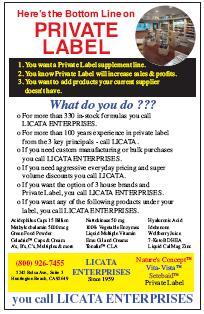 Retailers shouldn’t be shy about visiting the manufacturer’s plant or asking an independent lab to audit the plant. “Any hesitancy on the part of the manufacturer to allow this to occur is an early red flag,” Halpert notes.
Retailers shouldn’t be shy about visiting the manufacturer’s plant or asking an independent lab to audit the plant. “Any hesitancy on the part of the manufacturer to allow this to occur is an early red flag,” Halpert notes.
To this tip, Hari adds that retailers should be choosey about manufacturer quality. “Retailers need to see the endurance, innovation, science and clinical studies and educational support that better selling brands provide and highlight those values and excite their customers,” he says.
Licata agrees, noting, “We recommend they purchase from manufacturers who are members of the National Products Association Tru-Label program. They need to take ownership of their brand and do some studying of their own. Don’t just take what the manufacturer tells them about the product or ingredients, find your own information as to what you think is important to tell to their customers.”
Another suggestion for newcomers to the private label world is not to overlook staff and consumer education. Says Kohli, “Ensure all written material is well written and actually gives the facts they want to know: what is this, what does science show it does for me? How should I use it? What should I expect? Most manufacturers will share their literature and expertise for the particular product. Don’t limit it to in-store only. Post it on the Web, and if possible, see if you can have the local newspaper/magazine write about it.”
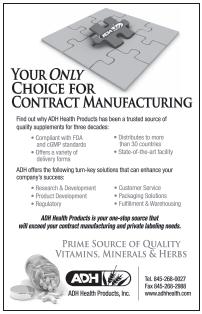 Betz notes education is especially important for organic brands, about which consumers often don’t have clarity. “If introducing USDA-certified products is the goal, consumer education is critical since there are so many ‘organic’ products in the marketplace, which by their claims confuse and mislead consumers,” she says, adding, “Attention to how that education will be done is key. The investment—emotionally and financially—is the foundation for a successful brand.”
Betz notes education is especially important for organic brands, about which consumers often don’t have clarity. “If introducing USDA-certified products is the goal, consumer education is critical since there are so many ‘organic’ products in the marketplace, which by their claims confuse and mislead consumers,” she says, adding, “Attention to how that education will be done is key. The investment—emotionally and financially—is the foundation for a successful brand.”
Silva offers some suggestions for how to educate staff about product quality and why they selected a particular manufacturer. “Vitamer Labs provides technical and staff trainings for our retailers, and has a free 24/7-access video on www.vitamer.com, which staff or prospective customers can view at their leisure.”
Last, small retailers shouldn’t feel they’re out of their league in the private labeling world. Many firms, like Golden Butterfly, cater to small retailers offering low minimums and top-quality products/customer service. In the case of Golden Butterfly, the minimum is 12 units per product. WF
References
- The Nielsen Company, “Nearly Three-Quarters of U.S. Consumers Agree Private Label Brands Are Good Alternatives to Name Brands, According to Nielsen Survey,” press release issued November 17, 2008.
- J.D. Power and Associates, “For Private Label Grocery Brands, Organic Products Drive Gain in Prestige Among Consumers,” press release issued March 25, 2009.
- T. Hale, “If You Thought All Store Brand Buyers Were the Same—Thing Again,” Facts, Figures & the Future, February 2009.
Published in WholeFoods Magazine, June 2009


